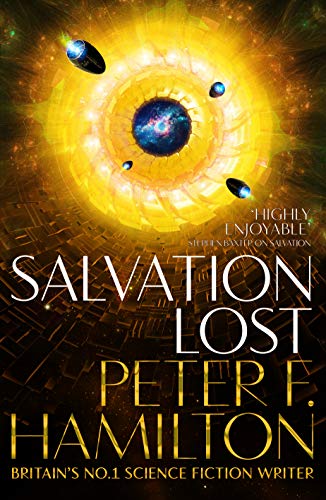This event happened in the past, yesterday evening (7-30pm 8th November 2019) to be precise at Foyles in Cabot circus, Bristol. Peter F Hamilton, Gareth L Powell and Emma Newman, ably chaired by Kristina Perez explored the art of creating engaging plausible and entertaining futures.
This was of course followed by a book signing – Peter F Hamilton had just published the second novel in his Salvation trilogy – Salvation Lost – which I look forward to reading.

But back to the topic of discussion…
Of course one of the questions was how do they design their future technology? Extrapolation of current technology could easily be seen for near term science fiction, but what of the long term, in 10,000 years say? The comment was that you could assume technology plateaued i.e. after some more innovation, stalled, which is what Peter admitted to in some of his novels.
That is not as creative as it sounds because there was general agreement that the big discoveries of science had happened way back when and it is generally accepted that we are more in the developmental stages of the consequences of the these discoveries.
They talked about the famous future shock. But as Emma pointed out rather than have one big step forward in technology every now and then as we used to do about 50 years ago, we are getting lots of small incremental changes. Think of computer upgrades and the like. So they considered the predicted future shock happening as unlikely, despite the speed up in technology implementation we are seeing these days.
There was general agreement that there are very few science fiction writers who do not reference the present day in one or another. it also helps to have a very old character in the novel to explain how history is applicable to the story.
One interesting aspect is that Kristina pointed out that all three novelists had a gothic ethos in their novels. This took them by surprise, but they found themselves agreeing with her assessment.
The novelists went on to describe their writing processes, which ranged from meticulous planning to writing on a wing and prayer with only an idea to guide you.
And it is a good job I stayed quiet… I had a lot to add to the technology prediction side of things and there were some points I even disagreed with. Otherwise we would still be arguing this morning.
So I will limit myself to a few points.
- The novelists used the word extrapolation repeatedly in the technology building. Yes, extrapolation is a major component, but there are other components to technology development. To be fair to the novelists, the skill set required for going beyond extrapolative processes requires a kind of meta-understanding of technology and how it develops. This is a rare skill.
- We are seeing a lot of novels about the impact of computers in our lives. They are bringing out very valid points. However they are concentrating on the extrapolation of the ‘Big Data’ branch of computing because that is the technology we are most in contact with. There are other computational branches that have hardly been touched at all in science fiction that will have a profound effect on our society in maybe twenty or thirty years time.
- I can understand why it is easier for a writer to say technology plateaus in the future. First off, readers will be more familiar with what they are reading. Secondly there is less strain on the writer’s imagination. However, I would like to point when the great science discoveries were made, the person in the street or on the farm thought they would never affect them profoundly, because they did not see how such discoveries apply to them. We are still making science discoveries today and we are yet to work out how they might impact our day to day lives. I don’t see future technology plateauing as soon as most science fiction authors write about.
All the authors there are damned good writers who tell damned good stories. These future technology comments do not in any way detract from their great achievements. I’m still going to read their novels.